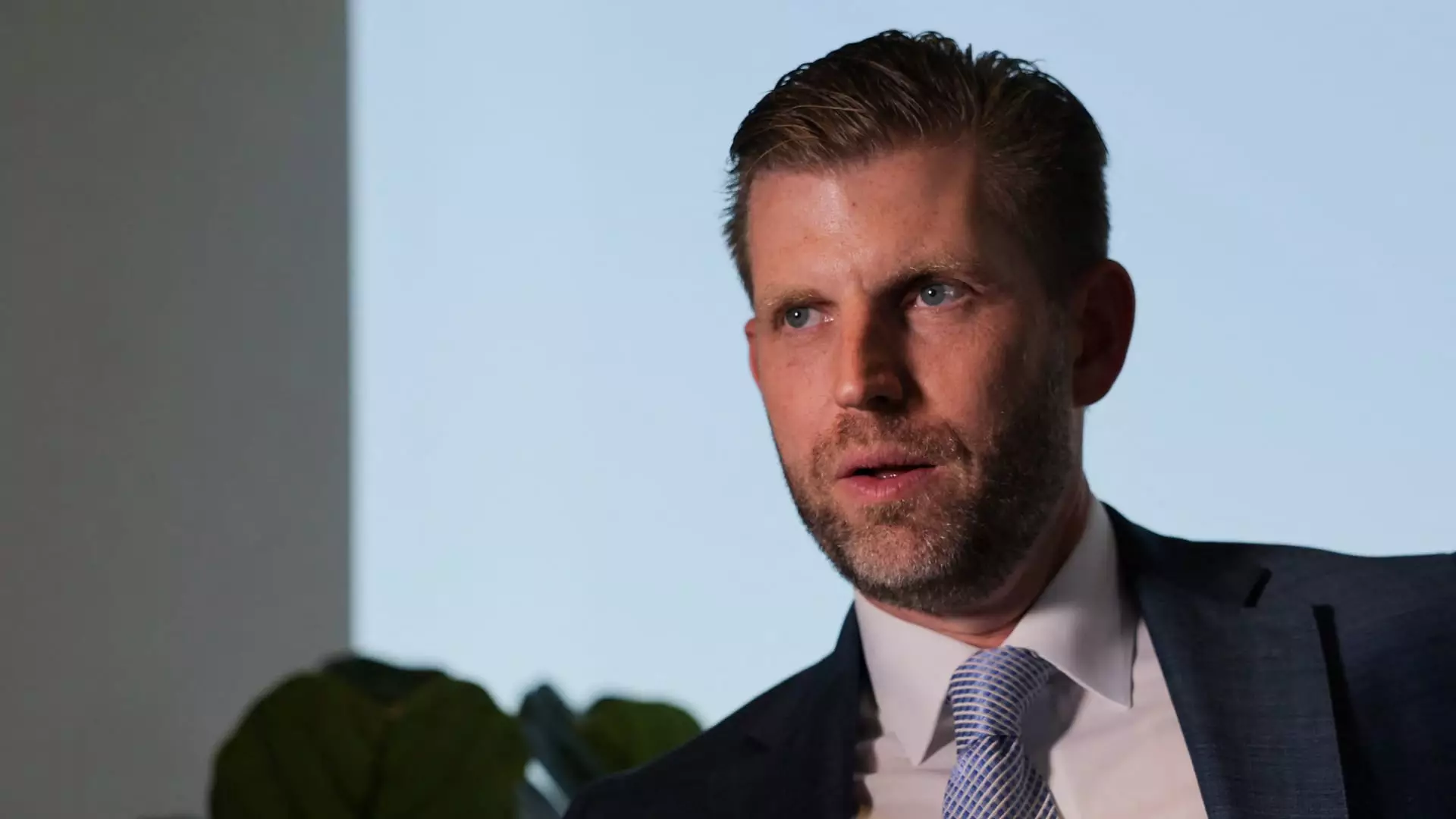In an era characterized by rapid technological innovation, it is rare for any institution, especially banks, to emerge unscathed. Eric Trump has recently thrown a metaphorical hand grenade at the traditional financial sector during an interview in Dubai. His assertion that the modern banking system is “broken,” “slow,” and “expensive” strikes a chord with a growing cohort disillusioned by financial institutions. What Eric Trump portrays as “antiquated” goes beyond mere criticism; it reflects a broader societal reckoning with centralized finance’s limitations in the face of emerging decentralized trends. As the executive vice president of the Trump Organization, his words resonate through both political and economic lenses, especially in a time when financial trust is incredibly fragile.
Banks have long enjoyed a monopoly over financial transactions, fortified by a complex network of fees, inefficiencies, and a lack of transparency. Eric Trump’s focus on the outdated practices of these institutions resonates deeply with the sentiments of many who see cryptocurrencies, particularly Bitcoin, as an avenue for financial liberation. However, his claim that banks are liable to face extinction in a decade, if they do not adapt to the disruptive innovations of blockchain technology, injects urgency into this conversation. While his warning may sound radical, the reality is that voices around the world are growing more critical of traditional banking methods.
The Shortcomings of Current Financial Systems
Eric Trump’s strong condemnation of the SWIFT system isn’t merely an opinion; it reflects a pervasive sense of impatience among consumers who demand more efficiency and less cost in their financial transactions. SWIFT has held a long-standing position in global finance, but it provides an inefficiency that is becoming intolerable in the fast-paced world of cryptocurrency. With decentralized finance (DeFi) platforms offering peer-to-peer transactions that occur instantaneously without excessive fees, the question arises: why should individuals continue to endure obsolete systems?
Moreover, Trump’s comment regarding the banking system’s preferential treatment for the ultra-wealthy exposes a fundamental injustice—one that agitates a significant portion of the populace feeling marginalized by conventional financing. The crypto market promises an alternative that could redistribute financial power more equitably. By harnessing blockchain technology, it’s conceivable to dismantle archaic gatekeeping that has perpetuated wealth inequality, especially for those disenfranchised by traditional banking practices. In Trump’s eyes—and many others—this is not just an innovation in finance but a movement for societal change.
The Rise of DeFi and Its Implications
At the heart of this financial revolution is DeFi, a growing ecosystem that operates independently of centralized intermediaries. Platforms that facilitate transactions enabling individuals to manage their assets without the interference of banks raise critical questions about the very nature of finance itself. The promise of zero transaction fees and immediacy in transferring assets makes it increasingly challenging for banks to justify their existence, especially as they grapple with regressive models that often serve their interests over those of their customers.
While some financial giants have started to pivot, launching blockchain networks and crypto trading desks, these efforts might seem reactive and insufficient. Real adaptation requires an overhaul of traditional mindsets rather than patching up the status quo. Crypto is characterized by its inherent volatility, yet this aspect often overshadows the long-term benefits presented by decentralized finance. The genuine question is whether banks can evolve quickly enough to meet consumer demand or if they will be swiftly outpaced.
The Ethical Quandaries of Trump’s Ventures
However, all of this criticism comes amid allegations of potential conflicts of interest, particularly concerning Eric Trump’s involvement with the crypto space through multiple ventures. The Trump family’s connection to cryptocurrency is not devoid of skepticism; and criticisms surrounding their alleged motives raise ethical questions. Are they legitimate advocates of a financial revolution, or are they capitalizing on a speculative bubble? Furthermore, as the Trump Organization delves deeper into cryptocurrencies, consumers must be wary of the potential pitfalls of intertwining business and political interests in an unfettered market.
Additionally, the establishment of a U.S. dollar-backed stablecoin through World Liberty Financial raises eyebrows. In a landscape already fraught with ethical dilemmas, could this be seen as consolidating power even further? One can argue that promoting alternative financial structures while benefiting from the traditional system’s efficiencies leads to a paradoxical situation, muddling the message of liberation versus opportunism.
As the UAE cements its position as a global hub for cryptocurrencies, it would be imprudent to ignore Eric Trump’s prophetic warning about the necessity for banks to adjust if they hope to survive. The stakes are high, and the consequences of remaining immobile may lead to a banking revolution that genuinely democratizes finance. This paradigm shift is not simply about technology; it speaks to deeper societal needs for equity, transparency, and trust. The world watches to see whether traditional banks will adapt, or if they will indeed become relics of a bygone era, supplanted by the fervent tide of cryptocurrency.

